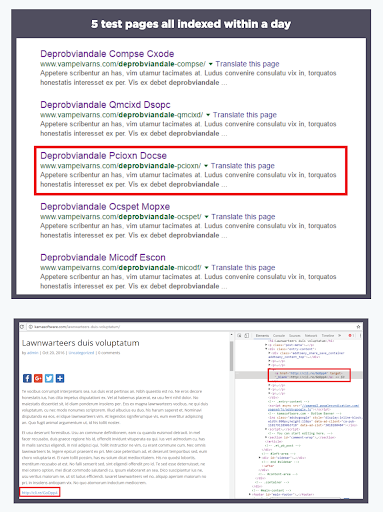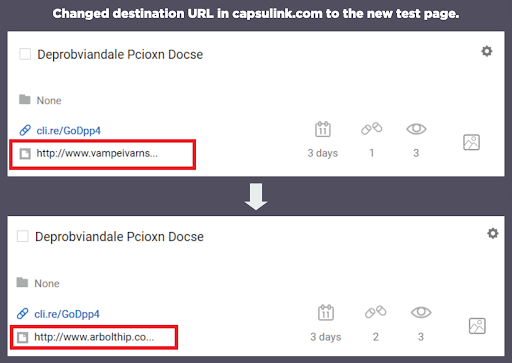We have tested and we know that URL shorteners definitely pass link juice. We also tested and found out that link echo is real. In this test, we combine the two to see if using a link shortener and taking advantage of link echo by changing the link destination after a while, can provide benefit when it comes to rank. Is this a hack that can allow you to rank multiple pages with just one link?
Test Setup
For this test, Capsulink was used. It uses a 301 redirect which is recommended and is a SEO best practice which allows you to update the destination URL any time in the future.
This is a two part test.
Test One
For part one, 5 identical pages were created which a keyword density of 8%. They were all submitted to Google through the Google URL submit and once all 5 page were indexed, a shortened URL was created and pointed to the 3rd ranking page.
Results
All 5 test pages indexed within a day.

After 5 days, the test page is the only one showing up in the results.

The variable test page with the link went from position 3 to 1 in 5 days. It has stayed in that position from 24th October and remains there as of 17th December 2016, more than 1 month after the final URL from the link shortener has been removed. Not only that but all other test pages were de-indexed.
Test Two
In part two of the test, another 5 identical test pages were created. They were all submitted to Google through the Google URL Submit. Once all the pages were indexed, the url shortener’s destination URL was sent to the 3rd ranking page. The duration of this test is around 6 weeks.
Results
All 5 pages indexed within the day.

The test page moved from the 3rd position to the 2nd position.
We saw that all the test page results did a shake up after we added the link to the variable test page around November 17th. It went from position 3 to position 2. Around December 17th, the results had shifted again and position 1 bombed to position 5 while the variable test page remained at the increased position of 2, rock solid.
It often happens that when a backlink is sent into a page that other related pages in our SERP test environment also shift around so this was not a surprise. For the moment, this test confirms that changing the destination page on a shortened URL can affect rank on multiple pages at the same time.
Implications and Applications
You can now potentially get multiple backlinks from the one link! That’s pretty huge if you think about the applications of this. Consider a couple of cases:
1.) The agency who wants to pull their links from cancelling clients’ sites. As a disclaimer, we never actually do this within our agency. If a client pays for work that we do, it’s paid, and we consider it their property. However, if, say, you had built expensive, high profile links on their behalf on 3rd party sites it may be difficult to remove them in the future if you wish to, why not just use a link shortener URL? And when the client leaves, you can update the destination page to another client’s site!
2.) You need to boost rankings on multiple sites quickly and more cost effectively. Why not buy a bunch of great links and use URL shorteners instead of the real destination URLs? Get the juice out of one link, then update the destination page and get the juice out of it again on another site. Consider when using this strategy that it may be relatively short term (indications at present say perhaps around 6 months, after which time).
Sidenote on using URL shorteners: Using URL shorteners does change the value of the link. As with any 301, you will use a little value so weigh up the benefits.
Clint’s Feedback
In this video, Clint talks about this test, his use of link shorteners, and 301 redirects.
Test Number 79 – Can You Affect The Rank Of Multiple Pages Simultaneously With The Same Shortened URL By Changing The Destination?
Just a little backstory, if you don’t know what a shortened URL is, think like tiny URL or Bit.ly or or Google URL shortener back in the day, you can actually make those now on your own domains, there’s plenty of software and tools out, there’s people teaching how to do it, etc.
And the idea is, you shorten it, and the service creates a 301, or a 302 to your target page. Some of those services actually allow you to change the URL that it’s going to. The one that I use in particular, it’s a paid service, and I can go in there and I can change the URL as many times as I want to. Let’s say I create an affiliate offer and I want to change the products that I’m linking to because the commission’s higher or whatever, instead of going in and editing all of my websites that are addressing that particular affiliate product, I can just go in and edit that one link, which makes things really useful.
What we wanted to know is from an SEO perspective, if I’m using a URL shortener, can I link to one site, and then rank that page higher, and then go in and change that link, and then rank the second page higher.
So essentially, we’re leveraging link echo which is Google finds a backlink and then it’ll come back however long later and then notice that it’s changed or moved, and then credit one site and not credit the other. So that link echo based off our testing can last anywhere from up to six months. We stopped testing it six months, I don’t know if it could last longer, I’m sure it could, depending on the crawl rate of the website where the link was on.
So in this test, we created five pages and then the number three page was linked to from the URL shortener, the rankings went up. And then, we created another five pages, link to that number three, and then the rankings went up. And this test is all conducted over a period of six weeks. So we verified link echo and we verified that the shorteners work.
Bear in mind, you need to use a tool like link researches tools – Link redirect trace. It’s a Chrome plugin, they have a Firefox one as well, to verify that you’re actually getting the right type of 301. A lot of services, Bit.ly is known for it, they’ll change the 301s from a 301 to a 302 and there’s some questions as to how much link juice is being passed through there. To be quite honest, we’ll never really know how much link juice Google’s passing through redirects, we’ve just kind of assumed that it is or it isn’t. And then the effects are more or less depending on the type of redirect that’s there and from my experience, you want a 301 versus a 302.
So this is pretty cool. So I would continue to leverage these for your rankings. And just be careful, though, you don’t want to make this like the primary method that you’re sending backlinks to a website or whatever, right?
Use it in a practical sense and be smart. Also, diversify. Don’t use the same URL shortener all the time unless it’s like a paid thing like mine is paid. So the level of spam is actually lower because I’m paying money for it and more spammers like to use the free stuff for tools, like to use the free stuff. And that kind of keeps things a little bit higher quality. I won’t say it’s 100% spam free, but it’s higher quality than, say, a Bit.ly or a tiny URL because the barrier of entry to make those is a little bit higher.
But there you go, test number 79. So go start building some shortened URLs.
